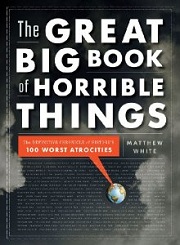The Great Big Book of Horrible Things: Book Review
This book, The Great Big Book of Horrible Things, by Matthew White, is a masterpiece.
We think the world is tough right now. But compared to what? If you think things today are upsetting, this book is for you. And if you think things are great, this book is for you too. If you skim even a few chapters you’ll arrive at a profoundly better understanding of what it is to be a person in a “civilized” world.
This book is a tour de force of history, using warfare and atrocity as the thread to understand civilization itself. The author, White, weaves his way through every major conflict with insight, wit, and delicate humor. He takes complex events and explains the causes, however dumb and disappointing, and provides a better understanding of current events and what we should want in the future.
As the title suggests, the book explores warfare, fratricide, genocide, and other terrible collective actions. White provides ranked lists of the most horrible events and the worst leaders, but not for sport. Instead he shows us what people, powerful people, have done in the past out of hope we can do better in the future.
The book provides a list of the worst 100 atrocities of all time. The last 50 pages lists his sources and methods for the historians who want to follow his trail (the references are online too).
Here are some choice quotes:
“People have been killing each other ever since they came down from the trees, and I wouldn’t be surprised to find bodies stashed up in the branches as well.”
“War kills more civilians than soldiers. In fact, the army is usually the safest place to be during a war. Soldiers are protected by thousands of armed men, and they get the first choice of food and medical care. Meanwhile, even if civilians are not systematically massacred, they are usually robbed, evicted, or left to starve; however, their stories are usually left untold. Most military histories skim lightly over the massive suffering of the ordinary, unarmed civilians caught in the middle, even though theirs is the most common experience of war.”
“Civilization before the Enlightenment was rather flexible when it came to historic accuracy, and ancient historians never let the truth get in the way of a good story.”
“Why Did Rome Fall? The best way to understand the fall of Rome is to skip the first half of any book on the subject. Yes, background and long-term trends are important, but some historians go so far back looking for the cause that they make it sound like Rome was tumbling toward its inevitable fall right from the start.”
“If we categorize the entries in this list according to which religions came into conflict, we get this simplified breakdown: Christian vs. Christian: 9 Muslim vs. Christian: 3 Christian vs. Jewish: 3 Eastern vs. Christian: 3 Jewish vs. pagan: 2 Muslim vs. Chinese: 2 Muslim vs. Muslim: 2 Human sacrifice in India: 2 Human sacrifice in Mexico: 1 Ritual killing in Rome: 1 Muslim vs. Hindu: 1 Manichaean vs. Taoist: 1
We can probably go even farther and group them into four larger categories: indigenous human sacrifice (4), monotheistic religions fighting each other (17), heathens fighting monotheistic religions (8), and heathens stirring up trouble all by themselves (1). In early history, the majority of religious killings involved sacrificing people to bribe and placate the dangerous forces of the universe. Then, Judaism and its offshoots, Christianity and Islam, devised a worldview where a single all-powerful god required a strict, uncompromising belief rather than tangible offerings.”
Thanks to Rob Lefferts (of the Lefferts law) for the recommendation.
Note: Light revisions 1/17/2025.


Reading his comments about civilians caught in wars, I remembered a quote from MASH; Hawkeye said “War is war and hell is hell, and of the two, war is worse; there are no innocent bystanders in hell.”
Some of the best reporting done in the last decade or so has been following up on the civilians in all these countries where we have been involved in “police actions.”
Is there a general finding from these follow-ups of victims of previous police actions?
Thanks,
Bill